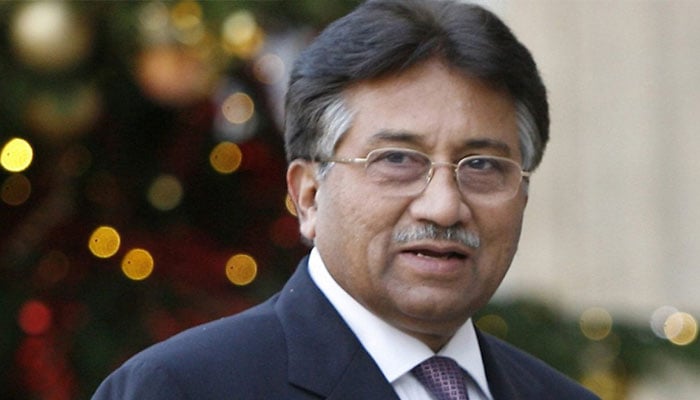Law ministry refuses to share details of lawyers, fee paid for Musharraf trial
The Ministry of Law and Justice has refused to share information about the details of lawyers engaged for prosecuting former military dictator Gen (retd) Pervez Musharraf on treason charges and fee paid to them.
ISLAMABAD: The Ministry of Law and Justice has refused to share information about the details of lawyers engaged for prosecuting former military dictator Gen (retd) Pervez Musharraf on treason charges and fee paid to them, saying it is a classified ministry, thus can’t be held answerable by common citizens.
An application was filed under Right of Access to Information Act 2017, commonly known as RTI law, by a taxpayer who wanted to know how judiciously the money contributed by public through their taxes is being used by the ministry.
To the amazement of Mukhtar Ahmed Ali, the applicant, the ministry declared him ineligible to post such inquiries. Referring a Cabinet Division notification dated 1993 but without explaining and sharing the contents of that notification, the ministry claimed exemption saying it has been declared “classified, therefore, your request is hereby declined on this aspect.”
A month ago, Mukhtar had demanded the answers of four questions. He asked for the list of the members of the prosecution team and relevant law firms engaged for Musharraf’s trial under Article 6 of the Constitution and the fee paid to them.
He also sought details of out-of-pocket expenses (e.g. travel, lodging, meal etc.) reimbursed to them. He also asked for the fee break-up paid to each member of the legal team.
After refusal from the ministry, Mukhtar has moved to Pakistan Information Commission, an appellant body set up under the RTI law for dealing with the complaints lodged by the applicants against the government. In a rejoinder sent to the ministry, Mukhtar said his application has been rejected without being given due consideration as the ministry “has not even bothered to consider Article 19A and the (Right of Access to Information) Act in the course of deciding my application.”
The ministry’s response is vague, his rejoinder continues, as it refers to a Cabinet Division’s notification but doesn’t explain what exactly the notification says and how is that applicable in relation to an application filed under the Right of Access to Information Act 2017. The Act has overriding effect vide its Section 25 and, therefore, inconsistent provisions in other laws cannot be used to deny information requests under this Act, he further argues. “Yet the Ministry has tried to hide behind a mere administrative notification, which has no legal effect in the presence of explicit provisions of the Right of Access to Information Act 2017,” Mukhtar explains.
The requested information is about the use of tax-payers’ money in relation to a matter of public importance and, therefore, its disclosure is not likely to cause any harm to public interest, he argues. “In fact, by disclosing the requested information, the Ministry of Law and Justice will demonstrate its commitment to transparency and good governance and, hence, will contribute to building public trust in the government,” he noted.
Mukhtar further pointed out that the Cabinet Division notification which was referred in order to decline the information request was issued a long before the insertion of Article 19A in the Constitution in 2010 whereby right to information was declared a fundamental right of every citizen. Therefore, he concludes, reliance on the notification to deny access to information amounts to deliberate violation of citizens’ fundamental rights. The said notification, therefore needs to be declared as contradictory to the Article 19A of the Constitution and provisions of the Right of Access to Information Act 2017, he demanded.
-
 Andy Cohen Gets Emotional As He Addresses Mary Cosby's Devastating Personal Loss
Andy Cohen Gets Emotional As He Addresses Mary Cosby's Devastating Personal Loss -
 Andrew Feeling 'betrayed' By King Charles, Delivers Stark Warning
Andrew Feeling 'betrayed' By King Charles, Delivers Stark Warning -
 Andrew Mountbatten's Accuser Comes Up As Hillary Clinton Asked About Daughter's Wedding
Andrew Mountbatten's Accuser Comes Up As Hillary Clinton Asked About Daughter's Wedding -
 US Military Accidentally Shoots Down Border Protection Drone With High-energy Laser Near Mexico Border
US Military Accidentally Shoots Down Border Protection Drone With High-energy Laser Near Mexico Border -
 'Bridgerton' Season 4 Lead Yerin Ha Details Painful Skin Condition From Filming Steamy Scene
'Bridgerton' Season 4 Lead Yerin Ha Details Painful Skin Condition From Filming Steamy Scene -
 Matt Zukowski Reveals What He's Looking For In Life Partner After Divorce
Matt Zukowski Reveals What He's Looking For In Life Partner After Divorce -
 Savannah Guthrie All Set To Make 'bravest Move Of All'
Savannah Guthrie All Set To Make 'bravest Move Of All' -
 Meghan Markle, Prince Harry Share Details Of Their Meeting With Royals
Meghan Markle, Prince Harry Share Details Of Their Meeting With Royals -
 Hillary Clinton's Photo With Jeffrey Epstein, Jay-Z And Diddy Fact-checked
Hillary Clinton's Photo With Jeffrey Epstein, Jay-Z And Diddy Fact-checked -
 Netflix, Paramount Shares Surge Following Resolution Of Warner Bros Bidding War
Netflix, Paramount Shares Surge Following Resolution Of Warner Bros Bidding War -
 Bling Empire's Most Beloved Couple Parts Ways Months After Announcing Engagement
Bling Empire's Most Beloved Couple Parts Ways Months After Announcing Engagement -
 China-Canada Trade Breakthrough: Beijing Eases Agriculture Tariffs After Mark Carney Visit
China-Canada Trade Breakthrough: Beijing Eases Agriculture Tariffs After Mark Carney Visit -
 Police Arrest A Man Outside Nancy Guthrie’s Residence As New Terrifying Video Emerges
Police Arrest A Man Outside Nancy Guthrie’s Residence As New Terrifying Video Emerges -
 London To Host OpenAI’s Biggest International AI Research Hub
London To Host OpenAI’s Biggest International AI Research Hub -
 Elon Musk Slams Anthropic As ‘hater Of Western Civilization’ Over Pentagon AI Military Snub
Elon Musk Slams Anthropic As ‘hater Of Western Civilization’ Over Pentagon AI Military Snub -
 Walmart Chief Warns US Risks Falling Behind China In AI Training
Walmart Chief Warns US Risks Falling Behind China In AI Training




